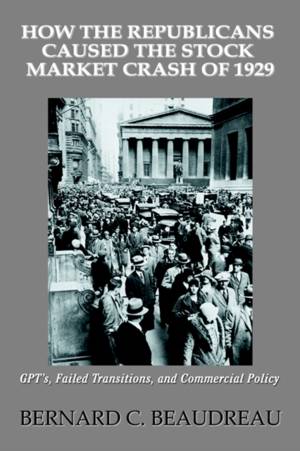
- Afhalen na 1 uur in een winkel met voorraad
- Gratis thuislevering in België vanaf € 30
- Ruim aanbod met 7 miljoen producten
- Afhalen na 1 uur in een winkel met voorraad
- Gratis thuislevering in België vanaf € 30
- Ruim aanbod met 7 miljoen producten
Zoeken
How the Republicans Caused the Stock Market Crash of 1929
GPT's, Failed Transitions, and Commercial Policy
Bernard C Beaudreau
Paperback | Engels
€ 26,45
+ 52 punten
Omschrijving
This book presents an alternative view of the Stock Market Boom and Crash of 1929 as having resulted from government intervention, specifically from a case of flawed government policy in the form of the Republican party's 1928 election promise of an upward tariff revision―the Smoot-Hawley Tariff Bill. As such, the stock market in particular and the market mechanism in general were not to blame, government was. Where the market was to blame, however, was in its reaction to the massive technology shock that was electric power-based extremely-high-throughput, continuous-flow mass production techniques (EHTCFPT) pioneered at the Ford Motor Company's Highland Park plant in Detroit, Michigan. Specifically, aggregate income and expenditure failed to rise commensurately with vastly increased productive capacity, resulting in under income.
Specificaties
Betrokkenen
- Auteur(s):
- Uitgeverij:
Inhoud
- Aantal bladzijden:
- 220
- Taal:
- Engels
Eigenschappen
- Productcode (EAN):
- 9780595379088
- Verschijningsdatum:
- 29/12/2005
- Uitvoering:
- Paperback
- Formaat:
- Trade paperback (VS)
- Afmetingen:
- 152 mm x 229 mm
- Gewicht:
- 326 g

Alleen bij Standaard Boekhandel
+ 52 punten op je klantenkaart van Standaard Boekhandel
Beoordelingen
We publiceren alleen reviews die voldoen aan de voorwaarden voor reviews. Bekijk onze voorwaarden voor reviews.











